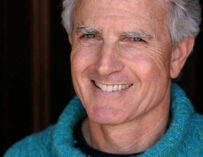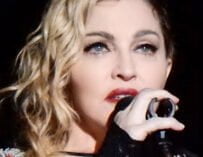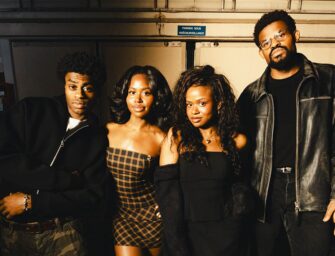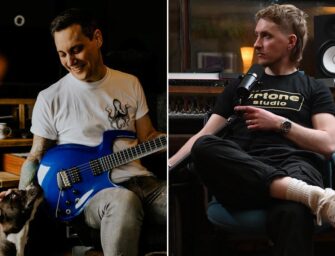
Litany: “It’s definitely the most confident I have ever felt after writing a song.”
The alt-pop artist dissects the Madonna-inspired track that shaped her debut album – where denial meets defiance on the dancefloor
Litany, the moniker of Harrogate-based songwriter Beth Cornell, occupies a distinctive space in modern pop – one defined less by spectacle than by a careful balancing of vulnerability and structure. Her music resists easy categorisation, folding bright, streamlined production around lyrics that deal with emotional experience. With Sadgirl, her debut album on Nettwerk, she draws from her life experiences to paint a portrait of psychological fragmentation and the slow, often cyclical process of repair.
Across 11 tracks, the album traces a clear thematic arc: from avoidance and self-doubt to tentative self-recognition. Songs such as Kingpin and Vertigo are unflinching in their detail, while moments of levity – Jelly Tot, Future Us – act as necessary counterweights. The title track, Sadgirl, functions as a conceptual anchor; anchored by a deliciously squelchy bassline, it channels denial into movement, transforming a moment of internal reckoning into something insistently physical. So it’s over to Litany to share the details of the song’s creation…
INSPIRATION
Going into this songwriting session, I knew exactly what I wanted to write about (which isn’t always the case). In my mind, despite not having had this cleared by the powers that be, I wanted to make an album about my personal struggles with mental health and depression. It’s not linear; you’re not just sad one day and suicidal the next, it’s a real tumultuous journey and one, in my experience, that’s filled with all five stages of grief looping at all times – grieving the person you were or could be if you weren’t incomprehensibly sad.
I’d been listening to a lot of late-90s/early-00s Madonna at the time and wanted to create something that sonically could have sat on either Ray Of Light or Music as it just felt so timeless and cool to me.

Litany: “I knew I wanted to write a song about the denial I faced…”
LYRICS
I set to writing this with long-time collaborators and friends James New and Paul Dixon, with whom I’ve also written Uh-huh, Adult Movies, and Jelly Tot to name but three. I knew I wanted to write a song about the denial I faced when coming to terms with the fact that my mental health wasn’t doing too great. I’m very close with my family and they know exactly if there’s something going on with me – I can’t hide anything from them successfully and they’re very quick and to raise a concern, usually at the dinner table.
“Here comes the TED Talk, the subject of course me” is the scene setter – I wanted to make it clear that this isn’t the first time doubts had been raised as to my mental state and I was now well-versed in what to expect from an intervention.
Ultimately, I’m a performer, right? I perform the hell out of every tale I have to tell, like each anecdote is a dramatic reading or monologue (spot the theatre kid) and this has bled into my lyrical style. It’s tongue in cheek, often comedic and colloquially conversational.
MUSIC
As I say, I was listening to a lot of late 90s early 00s Madonna and had told Paul (Fyfe) that I wanted to make an album that could slot in-between Ray Of Light (1998) and Music (2000) – something that just screams lost Madonna album of 1999. Paul had already made a little ditty upon us walking into the session which was the ‘wah-wah-wah’ loop which was almost reminiscent of Favourite Game by the Cardigans combined with a Jamiroquai-level bassline. Once we injected a little of that Madonna, Sadgirl was formed and we absolutely love it.

Litany: “I kept wanting to listen to it and revisit it more often than any other demo I’d made.”
IN THE STUDIO
We’ve often joked about being a winning writing combo as, as of yet, we have not failed to write a really great song together and I remember the feeling in the room that day was almost cocky because it was clear early on that we were onto another. James and I were really in synch on the lyrics front that day – he loved the concept and it was just such a joy to bounce off him. I vividly remember singing a chorus hook, not too dissimilar to the final product’s, but James just shouted something like, “Oh my GOD. go up on the happy-yyyyy,” To which Paul said, “LIKE DONNA SUMMER,” and it was in that moment we knew, we’d nailed it! Haha!
FINAL THOUGHTS
It’s definitely the most confident I have ever felt after writing a song. Any writer I know can attest to leaving a session not knowing if in a few hours you’ll hear it back and think, “What in the studio ear is this monstrosity?” but I didn’t feel that impending dread at all! Not only that but I kept wanting to listen to it and revisit it more often than any other demo I’d made. It feels timeless and unapologetically feel-good despite its somewhat dark-rooted subject matter. Because of its confident identity, it pretty much dictated where the rest of the record was supposed to go. Sadgirl supremacy!

































Related Articles